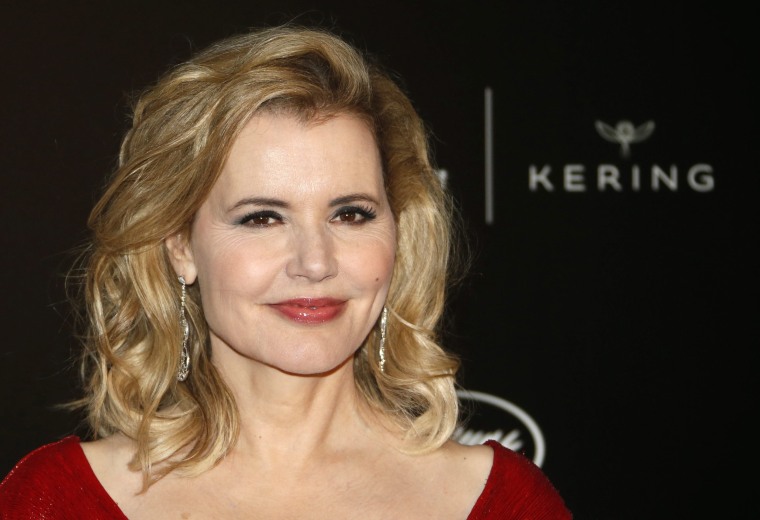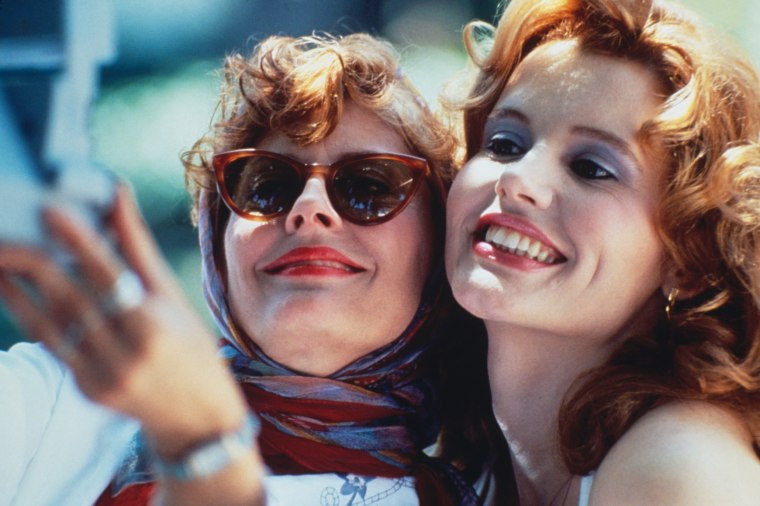When Oscar winner Geena Davis scored a surprise hit with "Thelma & Louise" in 1991, she heard that it was going to "change everything" in Hollywood. She heard the same thing when her female-driven baseball comedy "A League of Their Own" became a huge smash the following year. And yet, the industry's poor record on gender parity continued.
Now, after decades of successful films featuring women getting dismissed or diminished, Davis is taking matters into her own hands. She is executive producing a new documentary that begins shooting this month (tentatively titled "Gender in Hollywood) that lays bare the problem -- and why everyone, not just feminist movie buffs, should care.

"I started all this because when my kids were little I noticed vastly fewer female characters than male characters in movies made for kids," Davis told MSNBC. "I was appalled that we’re showing kids such tremendously gender-imbalanced stuff from the very beginning. I feel like we’re creating unconscious bias from minute one."
RELATED: #ActuallySheCan: Female filmmakers to make their mark at Tribeca Film Festival
According to Davis, who made her film debut in the 1982 classic "Tootsie," and starred in a steady stream of unconventional, but iconic, hits after that, unconscious bias is a big part of why, despite plenty of data to the contrary, studio executives still stubbornly cling to the stereotype that "women will watch men but men won’t watch women."
"We’ve all been raised on the same ratio of male-to-female characters, which has been the same since 1946 in film, we just don’t notice when female characters are missing," she said.
Davis admits that early in her career she presumed that the business was getting better for women, especially because of the variety of parts that came her way. But right around the time she turned 40, she started to see fewer offers and became much more aware of how women were getting sidelined as either eye candy or in thankless girlfriend roles, and that was if they appeared on screen at all.
"I got to play a baseball player, not the girlfriend of a baseball player, so I’ve been really spoiled," she admitted.
According to a study conducted by Dr. Stacy L. Smith at USC Annenberg and funded by the Geena Davis Institute on Gender in Media, 80 percent of the people portrayed in films simply holding jobs are male, compared to 50 percent of the workforce they represent in real life. And last year, the Center for the Study of Women in Television and Film's research of the top 100 grossers of 2014 revealed that just 12 percent of the protagonists were women, and only 30 percent even had females with speaking roles.
"At one point, in my late 40s, I said to my agent, 'Hey I want to take out an ad in Variety that says: not for nothing but I haven't retired, he was like 'no, just don't," she admitted. "For so long it just kind of wasn’t the thing to do ... complain about it."
But in the last two years there's been a mini earthquake in Hollywood. Patricia Arquette used her moment in the spotlight at the 2015 Academy Awards to call out wage inequality in the business while accepting her best supporting actress trophy for "Boyhood." Later that year, after a Sony hack revealed that Jennifer Lawrence was paid significantly less than her "American Hustle" co-stars, she too joined the fray. And the list of actresses who have since echoed the need for more representation and fairness -- from Gillian Anderson to Jessica Chastain -- has only grown.
And although that rebellion has been met with its own backlash, as evidenced by the caustic early reaction to the female-led new "Ghostbusters," Davis is encouraged by the direction the conversation is going.
"I feel like we’re on the right track to correcting that problem. In fact, I feel very confident in saying that the needle will move as far as female representation in kids TV and movies significantly within the next five or seven years. I think we’ve hit on the right tactic," she said. "It’s everywhere it just happens to be in our industry too."
What she hopes this new documentary can do is debunk some of the myths about female bankability and illuminate how much of an impact media images can have on the psyche of women and girls. "If they see it they can be it, so we have to show it," she said.

For years now, Davis has been doggedly working behind the scenes, meeting in person with producers, directors and executives to make the case for gender equality. Instead of demanding that they simply create female characters, she instead encourages them to simply change the genders of characters originally conceived as male to female.
RELATED: George Clooney has a solution for Hollywood's gender diversity problem
She cites Rey, the protagonist of the blockbuster "Star Wars" film "The Force Awakens" played by Daisy Ridley, as the kind of rich female characterization she'd like to see more of, and, if possible, be given the opportunity to play herself.
"I love acting and I love getting great parts, if I had my choice I will get more great parts," Davis, who turned 60 this year, said. "At every meeting I take I start by saying ‘what’s my next movie with you guys.’ When I say change characters from male to female I mean for me!"
The actress has taken some heat over the fact that a man, Tom Donahue, is directing the gender-focused documentary, when there is such a huge dearth of female filmmakers getting gigs in Hollywood. According to Davis, the idea for the project originated with him and his participation is a testament to the need for male allies in this endeavor.
"We need men – we cannot do this by ourselves," she said. "It's very important to encourage someone like Tom who has the passion, who is a feminist and wants to help the cause by doing something like this."
The unique moment we're in -- with a woman as the presumptive Democratic presidential nominee -- isn't lost on Davis, who once played a first female commander-in-chief on an ABC series a decade ago.
"Hillary becoming president, which I firmly believe will happen, is absolutely fantastic in many ways. The thing to watch will be how soon is it just as likely that we’ll have a female president as a male president," she said. "That’s the big test, are we gonna get there, but I think there’s still so much unconscious gender bias that we don’t know about."
According to Davis, who also headlines a new annual film festival that highlights the work of minorities and females both in front of and behind the camera, achieving equality in Hollywood will be much easier than in politics.
"When the needle moves on on-screen representation for the first time in seven decades that will be historic," she said. "It’s the one area of great gender disparity that can be fixed instantly. We can absolutely fix it overnight, the next TV show, the next movie can be gender balanced."